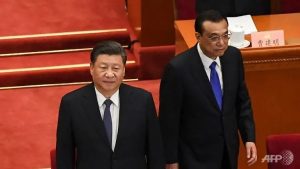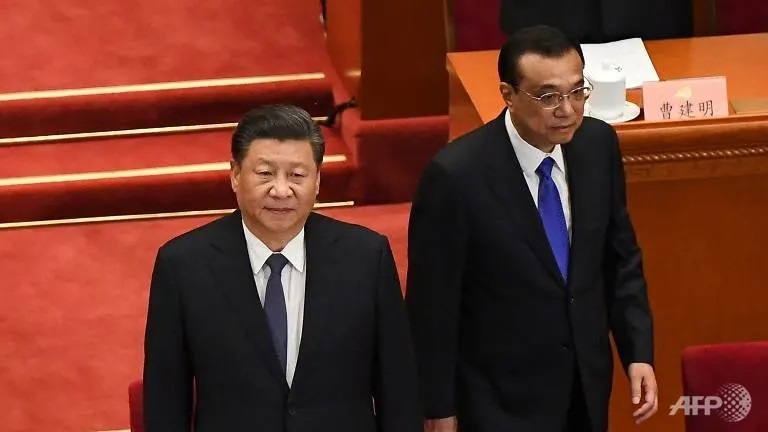
Chinese President Xi Jinping (left) and Premier Li Keqiang arrive for the opening session of the Chinese People’s Political Consultative Conference at the Great Hall of the People in Beijing.
BEIJING: China refrained from setting a 2020 gross domestic product growth target and pledged to step up spending and financing to support its economy, according to Premier Li Keqiang’s work report released on Friday (May 22) at the start of the annual parliament meeting.
Given “great uncertainty” caused by the COVID-19 pandemic, Beijing will “give priority to stabilising employment and ensuring living standards”, Li told the opening of the National People’s Congress.
It marked the first time that China did not set a GDP goal since 1990 when the government started to publish such targets.
Li said China was “keenly aware of the difficulties and problems” the country faced, with COVID-19 sending the world economy into recession.
“We have made major strategic achievements in our response to COVID-19,” Li told mask-wearing delegates in Beijing’s cavernous Great Hall of the People.
“At present, the epidemic has not yet come to an end, while the tasks we face in promoting development are immense,” he continued, adding that China’s government must “redouble our efforts to minimise the losses resulting from the virus”.
Li also announced that China’s fiscal deficit was expected to be more than 3.6 per cent of GDP this year, with a deficit increase of 1 trillion yuan (US$140 billion) over last year.
Another 3.75 trillion yuan will be issued in special government bonds this year, in a bid to boost infrastructure spending in the virus-hit economy.
The amount represents a 1.6 trillion yuan increase over last year, and a larger proportion of the bonds can be used as project capital, with priority given to items like new infrastructure, Li said.
He also said governments at all levels should “tighten their belts”, and that all types of surplus, idle and carryover funds will be withdrawn and re-allocated, to be put to better use.
Before the pandemic, China was expected to announce a growth target of around 6 per cent this year, allowing it to meet its key political commitment of doubling GDP from 2010 to 2020.
But with the COVID-19 shock causing the Chinese economy to contract 6.8 per cent in the first quarter from a year earlier, shrinking for the first time in decades, and with further damage on the cards, such a target was seen as no longer realistic.
China’s top leaders have promised to step up policy stimulus to bolster the virus-ravaged economy amid rising worries that job losses could threaten social stability.
Some local governments face relatively big pressure in safeguarding people’s livelihood and wages, China’s finance minister Liu Kun said on the sidelines of the parliament meeting.
Millions in China are expected by analysts to have lost their jobs as a result of disruptions from the coronavirus pandemic.



